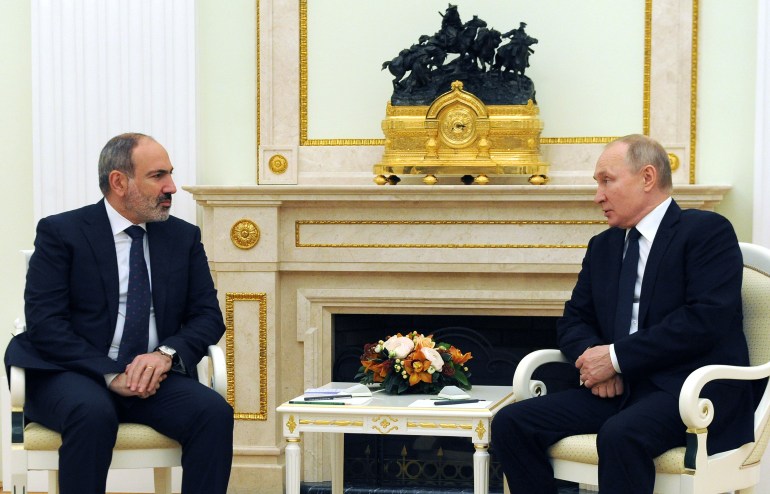Few political leaders are as embattled as Armenia’s Prime Minister Nikol Pashinyan.
Many in the South Caucasus nation blame him for the humiliating defeat in last year’s war with neighbouring Azerbaijan over the breakaway region of Nagorno-Karabakh.
Thousands of protesters, top generals and political opponents urged him to resign, while thousands of grieving families of refugees from Nagorno-Karabakh flooded Armenia.
And resign he will.
The grey-bearded 44-year-old has said he would step down later in April.
In a March 18 Facebook post, after much pressure to do so, Pashinyan announced a snap parliamentary vote in June as the “best way out” of the crisis.
But the resignation and vote are far from heralding Pashinyan’s political demise.
The My Step coalition he heads looks likely to win the election – and vote him in as prime minister again, according to a Gallup International Association poll held in late March.
Almost a third of voters are ready to cast their ballots for My Step, which now holds 75 percent of seats in Armenia’s unicameral parliament.
Meanwhile, Pashinyan’s main opponent, Robert Kocharyan, a former separatist leader who served as Armenia’s president in 1998 – 2008, trails far behind with less than six percent.
Marching to the Kremlin’s drum?
During the Nagorno-Karabakh conflict, as Armenia suffered losses, Pashinyan moved away from his pro-Western sympathies to accept Russian President Vladimir Putin as Armenia’s supreme international backer – and kingmaker.
On April 7, his almost four-hour meeting with Putin looked like a successful campaign stop – and a kowtow. He attentively listened to Putin, who assumed a mentor’s tone while talking to him in a Kremlin tea-room.
“We effectively discussed all the matters,” Pashinyan told a Russian broadcaster after the meeting. “Yes, I am very satisfied.”
Pashinyan negotiated the supply of Russian-made anti-coronavirus vaccines, discussed the construction of a nuclear power station that will be crucial for resource-poor Armenia, and secured Moscow’s help in the release of up to 200 Armenian prisoners of war held in Azerbaijan.
“The Kremlin fully controls the situation in Armenia, and premiere Pashinyan is no longer a threat to Moscow the way he was in the first years of his prime-ministerial work,” Emil Mustafayev, an analyst based in the Azerbaijani capital, Baku, told Al Jazeera.
In an op-ed published in the Kommersant daily on April 8, Moscow-based analyst Sergey Strokan wrote: “The former leader of Armenia’s ‘colour revolution’ became an example of how a bad boy transformed into a politician who finally understood who is who and how much things are.”
“Colour revolutions” are what the Kremlin hates and tries to suppress.
The term dates back to the 2003 Rose Revolution in Georgia and the 2005 Orange Revolution in Ukraine.
Both deposed pro-Russian leaders in favour of pro-Western ones, and the Kremlin still insists the West financed them.
To prevent a possible “colour revolution” in Russia, Putin toughened election laws, stifled the opposition and launched youth movements that were trained how to disperse protest rallies.
To stave off such uprisings in ex-Soviet republics, Moscow boosted its soft power and provided loans and arms to prop up Kremlin-friendly leaders such as Belarusian President Alexander Lukashenko.
But Pashinyan landed in the prime minister’s seat after leading an exemplary “colour revolution”.
The series of street protests in 2018 attracted up to 100,000 people in the nation of 3.5 million, and deposed a powerful clique of mainly pro-Russian officials.
Failed hopes
After Pashinyan came to power in 2018, many believed he would lead Armenia westward.
“There were many discussions among experts that the new democratic government of Armenia, with many overtly anti-Russian officials in its ranks, will gradually decrease Armenia’s dependence on Russia,” Yerevan-based analyst Benyamin Poghosyan wrote in an op-ed published by the KarabakhSpace.eu news website on April 12.
But “now, Armenia is more dependent on Russia than ever,” he concluded.
 Russian President Vladimir Putin attends a meeting with Armenian Prime Minister Nikol Pashinyan in Moscow, Russia April 7, 2021 [Sputnik/Mikhail Klimentyev/Kremlin via Reuters]
Russian President Vladimir Putin attends a meeting with Armenian Prime Minister Nikol Pashinyan in Moscow, Russia April 7, 2021 [Sputnik/Mikhail Klimentyev/Kremlin via Reuters]To some, this reality feels especially bitter given that despite a defence pact with Yerevan and a military base on Armenian soil, Moscow opted to sit out the recent war with Azerbaijan.
The conflict killed thousands on both sides, and according to a Russia-brokered truce, a huge chunk of Nagorno-Karabakh went back to Azerbaijan.
A gift for Putin
Pashinyan did not arrive in Moscow empty-handed.
In an apparent attempt to appease Putin, he let his worst political enemy off the hook.
One day before his departure to Moscow, Armenia’s Constitutional Court ruled to drop “coup” charges against Kocharyan – almost 13 years after he ordered to use violence against a street rally organised by Pashinyan, who was then a popular publicist.
Eight protesters and two police officers were killed during the 2008 crackdown, and Pashinyan was later sentenced to seven years in jail. He was amnestied after serving one year.
After the charges were dropped, Kocharyan immediately started forming an opposition coalition to run in the June 20 vote.
The coalition does not have a name yet, and its ratings are low now, but if Kocharyan manages to win or secure a sizeable fraction in parliament, the result will not be bad for the Kremlin either.
“With him, the team he formed while serving as Armenia’s president for 10 years, will return,” Yerevan-based political analyst Boris Navasardian told Al Jazeera.
